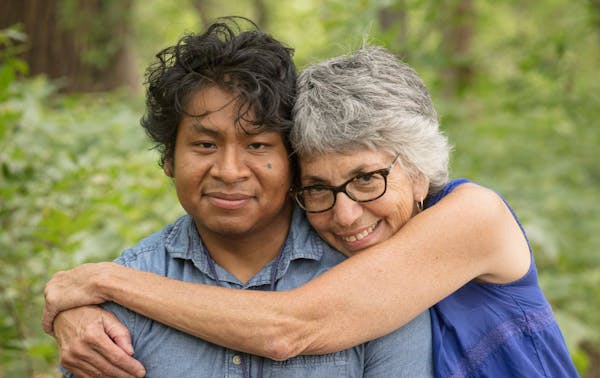 See
more of the story
See
more of the story
The third season of "Love Is Blind" dropped this week, and that means chatter is again bubbling up on a text group that my friend has aptly named "TV That Kills Brain Cells."
We are all harried, college-educated moms who don't watch a lot of reality TV, much less reality dating shows. But we readily submit to "Love Is Blind," which demands binge-streaming past a healthy bedtime and stalking the cast's Instagram accounts even in the waking hours.
The premise is ridiculous and it's embarrassing to type it out here: Lookin'-for-love singles "date" each other by communicating through a wall that allows them to hear, but not see, the other person. If they find a meaningful connection, they pair up and become engaged within 10 days, sight unseen. They are allowed to meet their partner in person only after the proposal.
Cameras continue to follow them as each couple attempt to expand their emotional bond to a physical one, and as real-world tensions and distractions — phones, family, careers, finances and friends — conspire to muddy their relationship. They decide at the altar whether to go through with marriage, just weeks after their first encounter.
You may be thinking, these people have lost their minds. And of course, you're right.
But what does it say about us?
I started hearing about the show last season when one of my friends started talking in depth about Deepti and Shake, two Indian Americans who fell for each other despite histories of not dating within their culture. Shake was the definition of shallow, my friend informed me. "But he's maturing throughout the show. I really do believe that," she told me.
"Just scum of the earth. Cringe narcissist," my other friend opined.
So I started watching it. After I watched a couple of episodes, I told her that I couldn't get into the series.
"Just keep watching," she advised.
Now in my third round, I can chart each season's slow burn. The first few episodes are still in fairy tale territory. It seizes that tiny latent part of you that secretly enjoyed Gerard Butler romcoms. Your heart softens, just a tinch, when courting couples produce emotional sparks despite not knowing the other person's height, race, body type, hair color or age. You root for them as they utter reasonable clichés that your 15-year-old self might have said, like, "Finding your soulmate should be like finding your best friend."
Attraction becomes more cerebral than corporeal. In the new season, Pilates instructor Raven describes her kryptonite: "Muscles completely blind me. Paralyzed. Blind. I'm helpless." But in this social experiment, she can try to move past physical hangups and try to fall in love with someone's heart and soul.
Yet none of this content is addictive. You need to keep watching for the train wrecks.
Once a couple start to live together and the twitterpations subside, the varnish suddenly wears off. In real life, we deeply get to know our partners — their insecurities, anxieties, baggage, sleep apnea and bad habits.
"If you want to, like, maybe pick up your towel sometime, and maybe not, like, throw it across the coffee table," suggests one cast member, 31-year-old Zanab, to her younger fiancé in a familiar master stroke of passive-aggressiveness.
On the show, which is set in Dallas this season, we see how humans can't help but make terrible decisions. We bear witness to how people link up not because of true compatibility, but because their heart is wounded or their ego craves flattery. The fights are as cringey as they are recognizable.
We understand that actually, extreme honesty — like admitting your attractions to another woman — is not the best policy. Within just 12 episodes, we can absorb the astonishing range of human fallibility.
My friend, a therapist, says maybe we watch "Love Is Blind" because we're fascinated by what "works" in a relationship— and what doesn't. Can two people who connect so deeply while talking through a wall overcome the fact that they don't share the same hobbies, interests, religion or culture? What does it take not just to be crazy in love, but to see your forever in someone?
The series can feel dark and depressing, as we see people — and ourselves — get in their own way of happiness. Only two "Love Is Blind" couples who've gotten married are still together, and they're both from the first season (Lauren/Cameron and Amber/Barnett). The series appeals to tens of millions of viewers because it tells us that no matter how dysfunctional our own relationships are, they're not nearly as messed up as they could be.
Is love blind? Not always. But it often can be chaotic, irrational and exhausting. And yet, sometimes it might just work.
We keep watching to see if love works, and that alone might be worth killing a few good brain cells.







